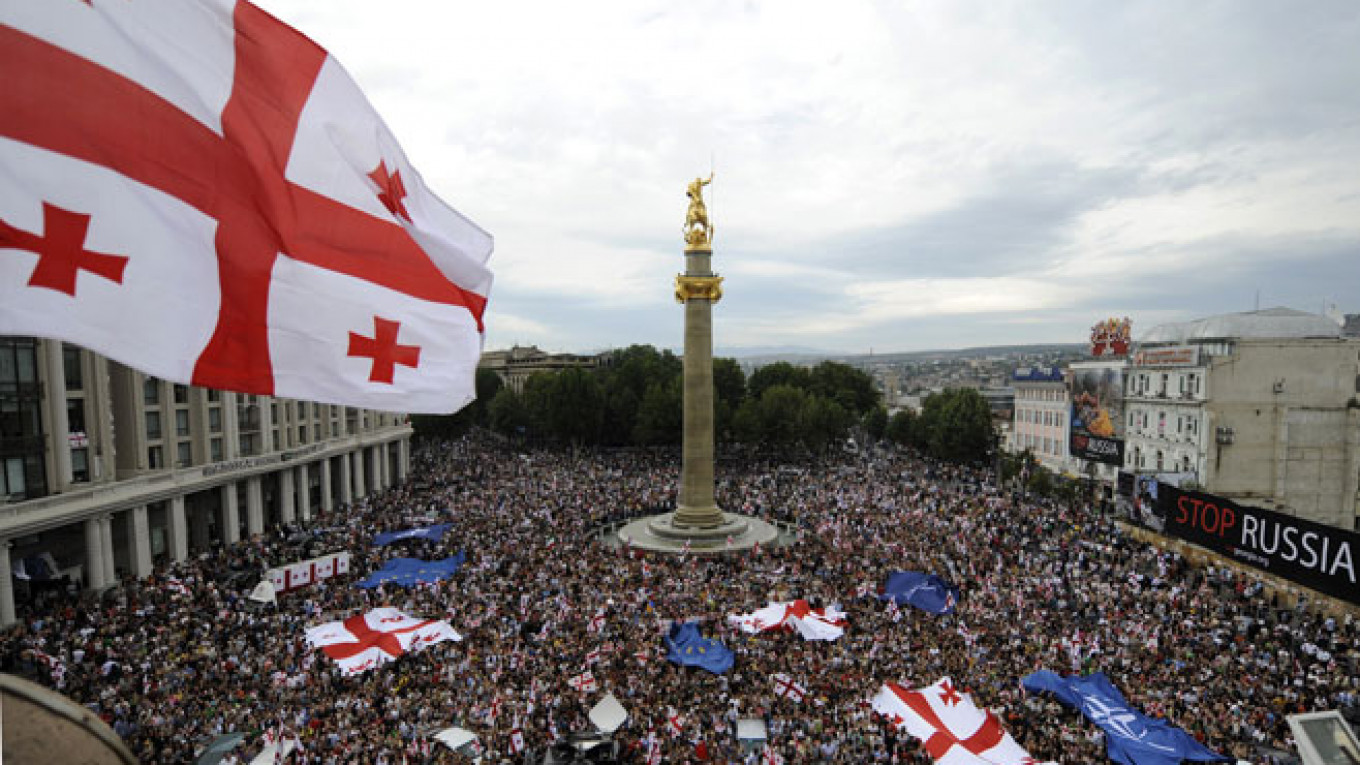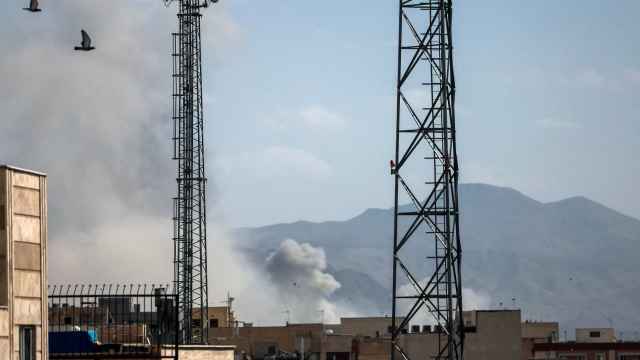Undeterred by the conflict triggered by Ukraine's swing towards Europe, the former Soviet republics of Moldova and Georgia will sign a trade and political pact with the European Union this month with Russia warning both countries against the move.
The two small countries — Moldova has a population of just more than 3.5 million and Georgia has 4.5 million — see the signing of an association agreement as the crucial step towards mainstream Europe, leading to eventual membership of the powerful EU trading bloc.
But, as has been shown by their regional neighbor Ukraine, Russia sees their westward move further away from Moscow's sphere of influence as a geo-political setback that could threaten its markets, too.
Last November, Russia persuaded now-ousted Ukrainian President Viktor Yanukovych to pull out of an identical pact with the EU. When protests then chased him from office, Russia, in a backlash, annexed Crimea, and armed pro-Russian separatist groups sprang up in Ukraine's east and the battle there is still raging.
How Russia, which went to war with Georgia in 2008, will react now remains the big unknown but officials have warned of "possible consequences."
With Moldova and Georgia harboring pro-Russian breakaway enclaves themselves within their borders — all of which are hankering after union with Russia and look askance on EU association — both states have valid grounds for concern from a Russian response to the June 27 signature.
"I am afraid Russia may create some problems in Georgia before the signing. We need to be very careful this month. The Russians did it many times before," said Guram Chichinadze, a 57-year-old businessman, sipping coffee downtown in Tbilisi.
Moldova fears Moscow might impose visa requirements on Moldovan citizens working in Russia — something which would immediately strangle a valued source of income into its struggling economy.
Or Russia might extend a ban on imports of Moldovan wines — already in place since September last year — to include fruit and vegetables that could hurt another source of export income in the land-locked country.
In the case of Georgia — which, unlike Moldova, has no borders with the EU and is less dependent on Russia for energy — the biggest fears are political rather than economic.
Having been frustrated in its desire to join the U.S.-led bloc NATO and with the 2008 war with Russia behind it, Georgia would seem to be more vulnerable as a Russian target now.
Politicians in Tbilisi see a possible threat coming from Russia absorbing the Abkhazia and South Ossetia regions — both now recognized by Moscow but by few other countries as independent states — in a Crimea-style move.
"There is an aggressive attitude from Russia not only towards us, but towards any ex-Soviet state which has European aspirations. But this does not mean that we will reject our free choice," said Irakly Sesiashvili, the head of the parliamentary defense and security committee.
Firm Commitment
With both states however firmly committed to signing the agreement in Brussels, it would seem too late for anything more from Russia now other than warnings of damage to their economies. But the consequences of signature might follow swiftly.
Joining a free trade zone with the EU and with the prospect of cheaper imports of consumer goods from Europe will bring only long-term benefits rather than overnight miracles to help Moldova and Georgia's struggling economies.
That is recognized by their leaders who emphasize more its political significance and symbolism.
Moldova, for instance, sees, down the road, the prospect of EU funding helping it to modernize its vital agricultural sector.
"These agreements mark the beginning of a process, not the end of one. But the symbolism of a signed agreement in Brussels is enormous — and that is why both Georgia and Moldova are so eager to have it," said Thomas de Waal, an independent analyst from the Carnegie Endowment for International Peace think-tank.
Moldovan Prime Minister Iurie Leanca said in an interview that his country would keep pressing for deeper ties with the EU.
"The signing of the agreement is not the final full-stop in our European aspirations. The next step is even more important — receiving the status of a candidate member of the EU," he said.
"The day after signing we will actively and effectively start working to get this status."
European Commission president Jose Manuel Barroso travels to both countries this week to square away arrangements before their leaders visit Brussels for the signing.
Of the two, the most important for Russia is Moldova because of the greater pro-Russian tendencies in its society and the proximity of Romania — a member of the NATO military bloc as well as the EU — on its western border.
Heavily dependent on gas supplies from Russia, it has been governed since 2009 by various pro-Western coalitions. Even the opposition communists have now publicly supported signatures of the pact.
Attending a Russia-Moldova joint economic meeting late last year, Dmitry Rogozin, a Russian deputy prime minister and Kremlin envoy to the Transdnestr republic, warned Moldova against being too quick to rush into the EU.
"Traveling at such a speed, a locomotive can lose its rear carriages," he said.
But opinion polls in Moldova show as many as 45 percent of the population would prefer membership of the Russia-led Customs Union rather than a European future.
In one southern region inhabited by about 140,000 ethnic Gagauz, a Turkic people, an overwhelming majority of voters in an illegal referendum voted for integration into the Russian-led Customs Union last February.
Trump Card
But Russia's biggest trump card lies in Transdnestr, a ragged Russian-speaking strip of land running down Moldova's eastern border with Ukraine where opposition to the pro-Western policies of the Chisinau government runs strong.
With a population of about 500,000, it is home to at least 1,200 Russian soldiers who guard tons of Soviet-era weaponry and ammunition. Commentators in Chisinau, the Moldovan capital, see it is as a sleeping dog that could swiftly be aroused if Moscow wished to foment unrest among Russian-speakers in the region.
"Over the longer term I think we can expect Russia trying to build up a stronger constituency in domestic politics in Georgia and supporting anti-European parties," said de Waal.
"Moldova is under much greater pressure and Russia has more cards to play there. Transdnestr has applied to join the Russian Federation and can be exploited."
Whether Russia has now quietly accepted the inevitability of a signature by the two states later in June is not clear. Nor is it known what retaliatory steps — possibly in trade restrictions of some sort — Moscow might make.
Russian Foreign Minister Sergei Lavrov is scheduled, however, to visit Chisinau on either June 17 or 18, giving him a last chance to spell out Moscow's view.
"It is Georgia's sovereign right to sign the Association Agreement with the EU, but it should also understand possible consequences," Russian Foreign Ministry spokesman Alexander Lukashevich told a news conference last month.
"Georgia's sovereign rights should be exercised without damaging the rights of others ... It is very important to understand the consequences that the upcoming signing of the Association Agreement between Georgia and the EU on June 27 may have."
See also:
U.S. Pledges Millions More in Aid to Ukraine, Moldova, Georgia
A Message from The Moscow Times:
Dear readers,
We are facing unprecedented challenges. Russia's Prosecutor General's Office has designated The Moscow Times as an "undesirable" organization, criminalizing our work and putting our staff at risk of prosecution. This follows our earlier unjust labeling as a "foreign agent."
These actions are direct attempts to silence independent journalism in Russia. The authorities claim our work "discredits the decisions of the Russian leadership." We see things differently: we strive to provide accurate, unbiased reporting on Russia.
We, the journalists of The Moscow Times, refuse to be silenced. But to continue our work, we need your help.
Your support, no matter how small, makes a world of difference. If you can, please support us monthly starting from just $2. It's quick to set up, and every contribution makes a significant impact.
By supporting The Moscow Times, you're defending open, independent journalism in the face of repression. Thank you for standing with us.
Remind me later.






